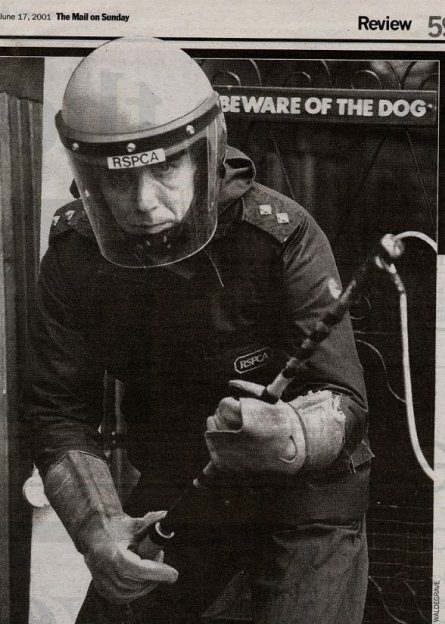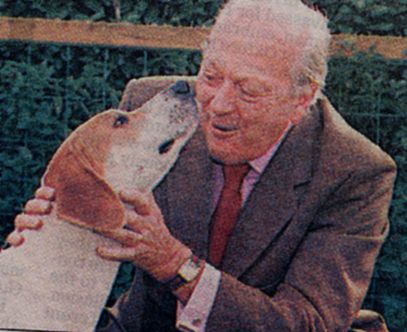The Mail on Sunday. June 17, 2001
KANGAROO
COURTS,
MUZZLED WATCHDOGS AND
FAT CAT BOSSES.....
IS THIS REALLY THE RSPCA?
 SPLIT
IN TWO BY EXTREMISTS AND UNDER FIRE FROMTHOUSANDS OF PET OWNERS, BRITAIN'S
OLDEST - AND RICHEST ANIMAL CHARITY IS AT CRISIS POINT
SPLIT
IN TWO BY EXTREMISTS AND UNDER FIRE FROMTHOUSANDS OF PET OWNERS, BRITAIN'S
OLDEST - AND RICHEST ANIMAL CHARITY IS AT CRISIS POINT
As the worthy members of the RSPCA convene for their annual general meeting in Wales later this month, there will no doubt be a ritual licking ofwounds. For Britain's biggest, richest and oldest animal welfare charity is riven with discord and under attack from all sides. At the heart of the hostility is a bitter struggle between fox-hunt supporters, who believe the Society has been infiltrated by loony animal rights activists, and campaigners for animal rights, who believe the Society has been infiltrated by blood- thirsty hunters.
The animal rights lobby directs particular loathing at the RSPCA's senior employees who, it says, are overpaid, ultra-conservative, authoritarian and ridiculously secretive.
The hunt supporters detest the elected members of the charity's governing Council who, they say, are either no-hopers or urban vegetarians with no interest in country issues.
Complicating the picture are the aggrieved owners of animals impounded by the RSPCA who are queueing up to sue, accusing the Society of arrogantly abusing its power and using its uniformed inspectors like a militaristic police force. A spokesman for the Charity Commission confirmed that it received 'quite a number' of complaints about the activities of the RSPCA.
On the Internet you can find plenty of individuals venting their anger against the organisation.
Victims Of The RSPCA, for example, is campaigning for a Government inquiry into the activities of the charity, claiming that it uses donated funds to violate the civil rights of animal owners.
Margaret House, co-founder of Watchdog, a critical newsletter, says: 'The RSPCA is undergoing the worst period of discord it has ever known. Members are treated in a despicable manner. There is no regard for natural justice and the secrecy is appalling.'
Mrs House, of Horley, Surrey, first joined a local branch of the RSPCA in 1974 and persuaded her late husband, a consultant anaesthetist, to become Chairman.
'When we started asking questions about the way the charity was run, every effort was made to remove us,' she says.
Watchdog is now a persistent thorn in the RSPCA's vulnerable flank. Along with her co-founders, Mrs House was at one time expelled from the organisation but later reinstated. She says she is now regularly harassed by RSPCA inspectors acting on 'anonymous' complaints that she mistreats her own dog, a Jack Russell-cross terrier which, ironically, she adopted from the RSPCA.
'People are harassed, victimised for speaking to the Press, hauled before terrible kangaroo courts if they step out of line. Is this the way a charity should be run?' she asks.
| Money squandered
on 'witch-hunts' |
Indeed, the charity, founded in 1824 with the laudable aim of preventing cruelty to animals, now seems to be generating enmity both inside and out.
Many critics blame the RSPCA's £90,000-a-year director-general, Peter Davies, a retired Major General appointed in 1991. Mr Davies was at the centre of controversy recently when Lord Mancroft, deputy chairman of the British Field Sports Society, revealed that at a meeting with the director-general in 1996 Mr Davies had suggested hunt supporters be encouraged to join the RSPCA to counter the influx of animal rights extremists.
 In the Doghouse...RSPCA chief Peter Davies. |
Mr Davies categorically denies Lord Mancroft's account of the meeting, but Lord Mancroft points out that there were a number of other people present who have similar recall to his own.
'I am firmly opposed to hunting with dogs,' says Mr Davies, 'and I have worked tirelessly to see an end to this cruel and outdated so-called sport. My wife and I have long been committed supporters of the campaign to ban hunting.'
Mr Davies claims the Countryside Animal Welfare Group (CAWG) tried to infiltrate the charity to overturn its policy of opposition to hunting. Earlier this year, the Society won a ruling in the High Court that it could exclude people from membership if they had ulterior motives for joining. Subsequently, 500 applications were 'frozen' pending investigation
. Event rider Richard Meade, three-time Olympic gold medal winner and long-time member of the RSPCA, was said to be behind the CAWG and was hauled before a disciplinary hearing of the ruling Council in London this week.
Meade's barrister responded with an elegant statement written by Sir John Mortimer QC pointing out that Meade's only 'crime' was to support fox-hunting. "This most inappropriate expulsion,' he argued, 'if allowed, will merely show that those who speak most loudly about animal rights have often lost sight of the fact that there are human rights also.' Members of the council refused to accept there was no legal basis for the hearing and later in the day it was announced that Meade had been expelled.The RSPCA issued a statement branding him as the 'ringleader' of a 'damaging campaign'.
Meade admits he has been actively encouraging what he describes as 'country people' to join the Society for years but not, he insists, with any subversive intent.
'It just seemed to me that , as country people look after the bulk of the animals in this country it was sensible they should be represented,' he said. 'Apparently members of the Council want to ban anyone who dissents from their views. It is disgraceful that they should squander money on this shabby affair.'
Money is the least of the Society's problems. Its reserves last year stood at £91 million and its income from legacies alone was in excess of £37 million.
Many animal lovers like to remember the RSPCA, which boasts the Queen as its patron, in their will.
The Society spends a huge amount of time and money every year investigating animal cruelty and bringing prosecutions - last year legal bills were to excess of £1 million.
Critics claim that under Mr Davies the Society has become an overbearing crusader, appareatly more interested in hauling animal owners through the courts.
Olive McFarland a 64 year old Suffolk smallholder and horse breeder, was raided by the RSPCA four years ago. She claims that a number of her horses injured themselves after being terrorised by low-flying military aircraft, but that the RSPCA inspectors were not interested in her explanation and forcibly removed all 27 animals.
Since then she has been fighting through the courts to have the horses returned.
'The RSPCA is a brutal organisation,' she says. "They are much more interested in getting scalps through prosecutions than in animal welfare.'
Judith Varley, a student from Washington, Tyne & Wear, discovered her pony was lame in September last year. When she returned from calling a vet, the animal had disappeared. She says it took her two days to discover that it had been taken away by the RSPCA. She still has not got her pony back.
| 'It seems
they get away with anything' |
Pedigree cat breeder Carol Jewitt from Morpeth, Northumberland , says she lost half her cats after a visit from the RSPCA in April, 1999.
"Their only reason for taking 12 cats away was that I had too many, which was ridiculous,' she says. 'I found the inspectors very intimidating. Since then we've been through hell. Everyone thinks the RSPCA can do no wrong, but they can get away with anything.'
The militarisation of the Society's front line - with uniforms and ranks ranging from 'Inspector" to 'Chief Superintendent' -also seems at odds with its simple pursuit of animal welfare. Eyebrows are also raised over the large number of animals that the Society puts down every year. Last year nearly 90,000 animals were destroyed because they were sick or injured and a further 1,600 because homes could not be found.
But Mr Davies rejects criticism. 'I believe the RSPCA does a wonderful job,' he says. 'No other society does more for animal welfare.'
Neither, he says, is the Society secretive or authoritarian.'You only have to examine the way our council members are elected to see that the Society's business is conducted in a fair and democratic way.'
Council member David Mawson, an admitted animals rights activist, may beg to disagree. The Society spent nearly £40,000 in legal fees trying, unsuccessfully, to eject him from the Council.
Mr Mawson, a 25-year-old London chef, complained to friends that he was the victim of a nine month witch-hunt, a 'horrible experience'. However, he could not go into detail because members of the Council are not allowed to talk to the media.
When I asked Celia Hammond, one of Britain's best-known animal welfare champions and a long-time member of the Council, what she thought of the RSPCA, she groaned. 'Ask me anything you like about anything except the RSPCA,' she said.
'I honestly can't say anything because I want to stay a member of the Council.'
Members gagged, kangaroo courts, animal owners bullied and intimidated, a man of the stature of Richard Meade expelled... if these claims are true, then what has it all to do with preventing cruelty to animals?